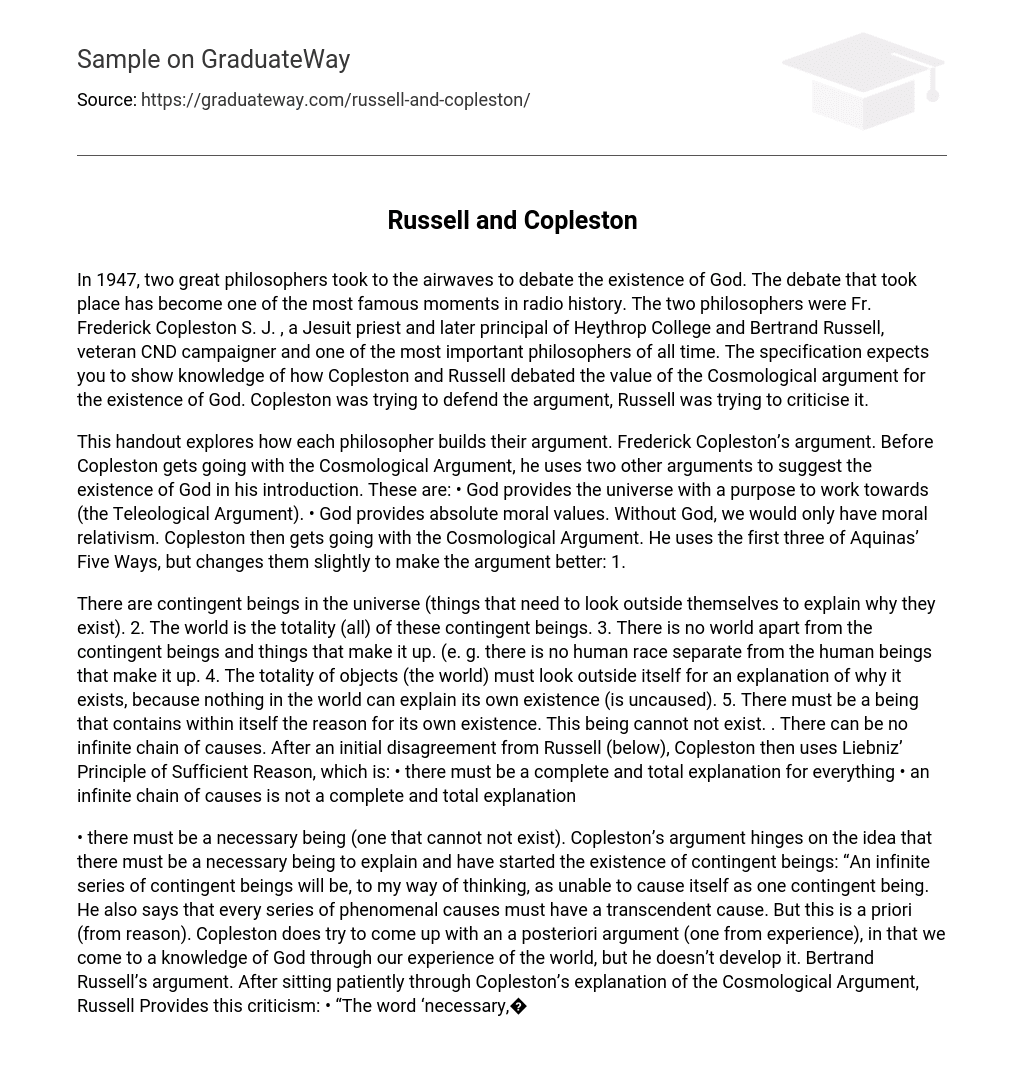In 1947, a radio debate on the existence of God took place between two renowned philosophers: Fr. Frederick Copleston S.J. and Bertrand Russell. This debate is historically significant in the field of radio broadcasting. Copleston, who later became principal of Heythrop College, was a Jesuit priest and supported the value of the Cosmological argument for proving God’s existence. Conversely, Russell, an influential philosopher and advocate for the Campaign for Nuclear Disarmament (CND), aimed to scrutinize this argument.
This handout delves into the arguments presented by philosophers regarding the existence of God. Frederick Copleston introduces his argument by first proposing two other arguments that suggest the existence of God. These include the Teleological Argument, which states that God provides the universe with a purpose to strive towards, and the argument that God establishes absolute moral values, as opposed to moral relativism. Copleston then proceeds to present his version of the Cosmological Argument, modifying Aquinas’ first three of Five Ways to enhance the argument.
There exists contingent beings in the universe, indicating the presence of entities that depend on external factors to account for their existence. The world encompasses all these contingent beings and does not possess a separate existence apart from the constituent entities within it. Each element within the world necessitates seeking external explanations for its own existence as no internal element can provide such an explanation. In simpler terms, there must be a being that inherently possesses a reason for its own existence and this being cannot lack existence. The concept of an infinite chain of causes is impossible to uphold. Copleston presents arguments in support of Liebniz’ Principle of Sufficient Reason, which upholds the necessity for comprehensive and absolute explanations for everything, with an infinite chain of causes failing to fulfill such requirements.
According to Copleston, there must be a being that is necessary and cannot fail to exist. He argues that this necessary being is required to explain and give rise to contingent beings. Copleston asserts that an infinite series of contingent beings, as well as a single contingent being, cannot cause itself. He also argues that every series of phenomenal causes must have a transcendent cause, which is based on a priori reasoning. Although he briefly mentions an a posteriori argument based on our experience of the world leading us to knowledge of God, he does not elaborate on it. In response to Copleston’s explanation of the Cosmological Argument, Russell criticizes the use of the term “necessary,” stating that it can only truly be applied to propositions.
Immanuel Kant’s argument states that the word ‘necessary’ can only apply to analytic statements, which are based on logic and reason rather than experience. Bertrand Russell criticizes this viewpoint and argues that the word ‘necessary’ becomes meaningless when applied to real things. Russell further emphasizes that our understanding of causes is derived from our experiences and observations of things being caused in the world.
However, this does not mean that the whole world or universe has a cause. The writer is criticizing Copleston for trying to justify an analytic statement about existence using a synthetic statement about cause. In reply, the writer argues that the universe just exists and that’s all there is to it. To further critique Copleston’s argument, the writer presents the analogy: “Every man who exists has a mother, and it seems your argument suggests that the human race must have a mother, but obviously the human race does not have a mother.”
Russell and Copleston had a disagreement during their debate. Russell did not agree with the idea of a necessary being and did not see the need to question the origin of the universe, resulting in a stalemate. In conclusion, Russell suggested moving on to another topic by saying, “Yes, it is very difficult. What do you say, shall we pass on to some other issue?” Copleston disagreed with Russell’s stance and compared it to playing chess with someone who refuses to make a move. For the full text of the debate, visit: www.ditext.com/russell/debate.html.





